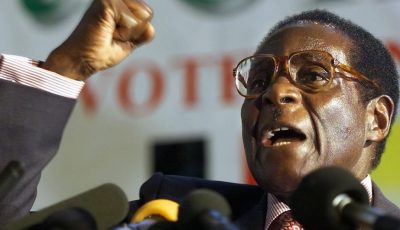Warning: Undefined array key "dirname" in /home/anapuafm/public_html/wp-content/themes/anapuafm/include/plugin/filosofo-image/filosofo-custom-image-sizes.php on line 133
Warning: Undefined array key "extension" in /home/anapuafm/public_html/wp-content/themes/anapuafm/include/plugin/filosofo-image/filosofo-custom-image-sizes.php on line 134
Zimbabwe uproar as roads named after Emmerson Mnangagwa
Zimbabweans have reacted with disbelief to news that the government has approved plans to rename major roads and buildings after “national heroes” – including 10 streets named after President Emmerson Mnangagwa.
Many of those honoured fought in the 1970s guerrilla war against white-minority rule and went on to become prominent figures in independent Zimbabwe.
Other African leaders such as Congo’s Patrice Lumumba, Jomo Kenyatta and Abdel Gamal Nasser are to have roads named after them, along with international leaders such as Cuba’s Fidel Castro, Leonid Brezhnev of the former Soviet Union and China’s Mao Zedong.
Many Zimbabweans took to social media to express concern that the cabinet spent time discussing the renaming of roads and buildings when the country was in a dire economic crisis.
Zimbabwe is suffering from a shortage of cash, which has led to the reintroduction of the Zimbabwe dollar, after a decade when the US and South African currencies were used instead.
So why is Zimbabwe changing the names of its streets?
Zimbabwe itself used to be known as Rhodesia, after the 19th Century British colonialist Cecil Rhodes.
It was renamed at independence in 1980 but in Harare (previously known as Salisbury) there is still a Cecil John Rhodes Drive, which will now be called Willie Musarurwa Drive, after a prominent Zimbabwean journalist.
And this is just the latest in a series of renaming programmes since independence.
Five road names which reflect the changing times:
- Speke Avenue, named after a British explorer, becomes Agostinho Neto Avenue, after Angola’s first president
- Livingstone Avenue, named after a British explorer, becomes Oliver Tambo Avenue, after the South African anti-apartheid leader
- Cecile Rhodes Drive, named after the British colonialist, becomes Willie Musarurwa Drive, after a Zimbabwean journalist
- Fife Avenue, named after a region in Scotland, becomes Leonid Brezhnev Avenue, after the former Soviet leader
- Allan Wilson Road, named after a British army officer, becomes Mgagao Camp Road, after a base for Zimbabwean independence fighters
But the BBC’s Shingai Nyoka in Harare notes that almost 40 years after the end of colonial rule, many roads, landmarks, schools still honour British heroes.
There are countless roads and schools named after the Royal family and prominent figures – Queen Elizabeth Girls High School, Prince Edward, Churchill Boys School and Allan Wilson Boys schools. Elizabeth Windsor Road, Princess Margaret Road, etc.
And of course one of Zimbabwe’s most famous landmarks is still known as Victoria Falls after the former British Queen.
The local Lozi people had named it Mosi-Oa-Tunya (the smoke which thunders).
In Zimbabwe’s second city, Bulawayo, Victoria Falls Road is now going to be renamed Mosi-Oa-Tunya Road.
And what about Robert Mugabe?
Although Mr Mnangagwa ousted Zimbabwe’s long-time leader Robert Mugabe in 2017, Harare’s hospital will be named after Mr Mugabe’s first wife, Sally.
Cynics will note that Mr Mnangagwa finally came out top in a bitter power struggle against Mr Mugabe’s second wife, Grace, in order to succeed him. So calling the hospital after Sally may be a little dig at Grace.
The president is obviously the biggest beneficiary of the latest renaming programme – one of Harare’s main roads, Enterprise Road, is to be called Emmerson Dambudzo Mnangagwa Rd, as are nine other roads and streets in cities around the country.
Some Zimbabweans are asking whether this is premature and vain, as he has only been in power for less than two years.
Despite being forced from power, several roads and Harare’s main airport, are still named after Robert Mugabe.
The airport’s name was only changed in 2017 – less than a week before he was forced to step down.
Source: BBC




